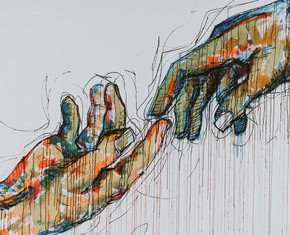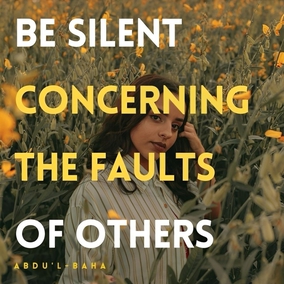The views expressed in our content reflect individual perspectives and do not represent the authoritative views of the Baha'i Faith.
So far in this series of essays, I’ve recounted my journey to become a Baha’i—would you like to hear what happened next?
I took the Baha’i path, the one less travelled by, and did I do what I was told without wandering from the prescribed twists and turns of that path? Did I pass by all the appropriate milestones so that I now eagerly await my final big milestone for the physical stage of my existence—the “transition” to the metaphysical stage of my life, known by the less informed as “death”?
Well, first of all, it seems that becoming a Baha’i does not end anybody’s story. And while Milton was correct, that “they also serve who only stand and wait,” there are several strategically important features of this path, this Baha’i life, that I feel must be understood before this wild ride can be appreciated. These features, what we might categorize as the Art of Living, are essential if we are to understand and embrace the object of our quest—to understand and become adept at the Art of Dying.
We might think of these rather important characteristics of the Baha’i life as heralded by cautionary signs, like the ones you see as you hike some path along a precipice or a water fall, those signs that tell you that you might get injured if you aren’t really careful, if your foot slips as you cross a creek on smooth stones, or if you should become distracted by the spectacular beauty of the light reflecting off the lake, or the pure magnificence of a water nymph basking on the bank as she tilts her face back, closes her eyes to feel the warm sun, and lets her sleek locks dry and flutter in the afternoon sun.
In other words, the art of living the Baha’i life is not a process of mindlessly doing what you are told. This path less travelled includes a virtually endless number of branches of equal value, each of which, if followed properly, is capable of taking you towards the same destination.
The Baha’i concept of life’s objective—short-term, medium-term, and long-term—involves us in pursuing our own inner spiritual development. But inasmuch as any given virtue is endlessly perfectible, so too the assemblage of these virtues for any given individual is likewise infinitely perfectible:
It follows, therefore, that every man hath been, and will continue to be, able of himself to appreciate the Beauty of God, the Glorified. Had he not been endowed with such a capacity, how could he be called to account for his failure? …For the faith of no man can be conditioned by any one except himself. – Baha’u’llah, Gleanings from the Writings of Baha’u’llah, p. 142.
This does not imply that we need to await some particular stage of progress, some point of “salvation” or certitude, before we feel good about this spiritual journey. Being in motion is existentially rewarding in and of itself. Even if we must constantly monitor our spiritual progress to be sure we do not rest in one place too long and thereby become stagnant or even regressive in our trek, this trail is marked by a panoply of tests, choices, trials and celebrations.
Paying close attention to the path is also important because it is entirely possible to plummet out of sight and thereby incur some serious injury if we do something really stupid, most especially when we fail to recognize what made us slip in the first place.

Aristotle
When such inattention to warning signs, or to the reason for our repeated failure, becomes habitual, we can develop a well-recognized symptom or syndrome that Aristotle characterized as hamartia. Known in classical theater as the “tragic flaw,” harmartia is most often indicated by a pattern of consistent failure to make good moral choices, usually because of some habitual or persistent flaw in our character.
Watch for Falling Rocks! There are signs to caution us about the “rules of the road,” pithy aphorisms regarding the more obvious sorts of pitfalls (and waterfalls). Baha’u’llah in one of his first works, The Hidden Words, provides a succinct collection of these. They are framed in rather general terms: Don’t get too involved with ego, sensuality, materiality or yourself. Don’t gossip about your fellow hikers or wish for them what you would not want to happen to yourself. Help those who are having trouble and, above all else, never forget to stay focused on your destination—the next life that awaits us all.
Some of these exhortations we may tend to forget because they are so obvious, like the signs along winding mountainous roads that caution us to watch out for falling rocks. To a certain extent, we might think these signs should more appropriately say, “Stay Off This Road, Stupid! It has Falling Rocks!” After all, we can watch the rocks all we want, and if they’ve already fallen, then obviously we should drive around the debris. But the implication of these signs is that rocks fall intermittently, unpredictably, sometimes catastrophically. How will keeping an eye out do much good in such a circumstance?
“Hey Dad!” calls the observant kid in the back seat, “We’re about to get hit by some falling rocks!”
The father, keeping his eyes peeled on the road ahead to avoid any debris from rocks that have already fallen, responds, “It’s okay, son! All the signs along the way told us this could happen. It’s just part of travelling on this road!”
Well, the Baha’i life, as well as the art of living it, is like that in some ways. Baha’u’llah provides all manner of guidance about how to acquire safe falling rock avoidance skills, as well as how to choose the safest routes, the ones without quite so many falling rocks. But he has also provided an operator’s manual about what to do when an accident occurs, because we all know that accidents will occur. At some point, we are going to get hit by falling rocks, and not necessarily because we did something stupid. In fact, the Baha’i writings state time and time again that suffering is an important means by which we traverse this path successfully. For example, one Baha’i prayer begins with the following invocation:
Glory to Thee, O my God! But for the tribulations which are sustained in Thy path, how could Thy true lovers be recognized; and were it not for the trials which are borne for love of Thee, how could the station of such as yearn for Thee be revealed? Thy might beareth me witness! The companions of all who adore Thee are the tears they shed, and the comforters of such as seek Thee are the groans they utter, and the food of them who haste to meet Thee is the fragments of their broken hearts. – Baha’u’llah, Prayers and Meditations, p. 155.
In the next essay in this series, we’ll consider what to do when your tribulations seem like a rockslide.
















Comments
Sign in or create an account
Continue with Googleor